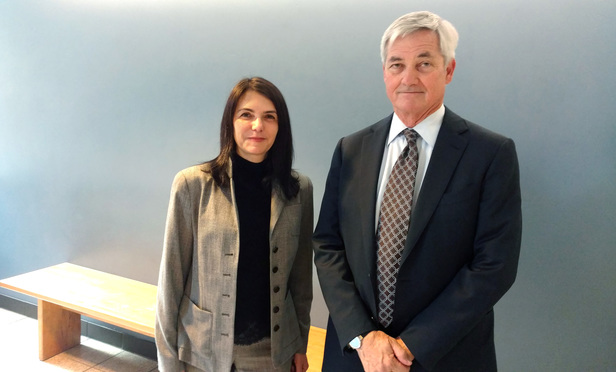 JAMS’ principal outside counsel, Long & Levit partners Joseph McMonigle and Jessica MacGregor
JAMS’ principal outside counsel, Long & Levit partners Joseph McMonigle and Jessica MacGregor
A San Diego Superior Court jury couldn’t decide if retired appellate justice Sheila Sonenshine made misrepresentations on her JAMS Inc. resume, but they were certain it didn’t cause any harm to venture capitalist Kevin Kinsella.
Following a three-week trial, jurors deadlocked Friday on Kinsella’s allegation that Sonenshine and JAMS falsified her credentials to attract successful business people as clients. But the jury found by an 11-1 vote that Sonenshine’s resume didn’t cause any harm Kinsella claimed to have suffered from having Sonenshine preside over his divorce for 15 months.
Kinsella’s attorneys asked for a mistrial based on an incomplete verdict, but Judge John Meyer denied it. He then dismissed Kinsella’s claims for restitution and an injunction under the Consumer Legal Remedies Act.
JAMS and Sonenshine were grateful for the result. “I’m very appreciative of my legal team’s efforts and dedication, and for the support of my entire family, especially my husband,” said Sonenshine. Ygal Sonenshine had sat by her side throughout the trial, often accompanied by their children.
Long & Levit partner Joseph McMonigle, who led JAMS’ and Sonenshine’s trial team, said his clients are “pleased with the outcome, and look forward to putting this behind them and providing preeminent ADR services.” Partner Jessica MacGregor, associate Andrew Massara and paralegal Graham Helm rounded out Long & Levit’s team, which was supervised by JAMS general counsel Sheri Eisner.
Kinsella’s attorney, Bryan Vess, said his client’s goal had always been to show that JAMS’ advertising was misleading. Because of the jury deadlock on that portion of the verdict, “we never got a ruling on the most important issue of the case, and that’s a bitter pill,” he said.
Meyer did not poll the jury on the deadlock, but juror Judy Richonne said afterward it was 8-4 in favor of JAMS and Sonenshine. She described jurors as fairly locked into that position from the start of deliberations Thursday morning.
A few jurors felt that Sonenshine was evasive at times when testifying, but others felt she was giving the best answers she could, according to Richonne. Meanwhile, “a lot” of jurors felt that Kinsella’s lawsuit was “a witch hunt” prompted by Sonenshine’s orders in his divorce case. In the end, jurors felt they couldn’t connect the allegations to damages, in part because Meyer had excluded much of it from evidence. “We had a very foggy picture” of the damages, Richonne said.
The verdict capped off a three-week trial that’s put a spotlight on how mediators and arbitrators promote themselves. Earlier this spring JAMS added a disclaimer to each of its online bios saying it makes no warranties about accuracy or completeness.
Kinsella, founder of Avalon Ventures, sued JAMS and Sonenshine in 2015. He accused them of falsely representing that Sonenshine founded and ran a private equity fund that invested in women-owned businesses. Sonenshine acknowledged at trial that the fund didn’t raise any outside investment. Instead she and her husband invested $1 million in three companies, though none of them succeeded.
Kinsella also charged that Sonenshine touted her co-founding of an investment bank without disclosing that the bank paid $41 million to settle fraud claims. JAMS and Sonenshine argued that the bank, EquiCo, had generated billions in liquidity and that the suit was filed years after Sonenshine had sold the company.
McMonigle and MacGregor endeavored to show that each challenged statement in the bio was truthful, and that Kinsella was simply an unhappy litigant who hired a team of investigators to harass Sonenshine and manufacture bogus excuses to hound her off his divorce case. She recused herself in the interest of justice in 2014.
After deliberating most of Thursday and part of Friday, jurors reported they were deadlocked on the question of whether Sonenshine had misrepresented her status or the quality of her services. They asked Meyer if they could skip ahead on the verdict form to the issue of causation. Over Vess’ objection, Meyer told them to deliberate some more, and if they were truly deadlocked then to skip ahead. They returned after an additional 45 minutes of deliberation.
An alternate juror who gave only her first name, Kathy, was not impressed with either side’s case. “I don’t know anyone who puts a failed business venture on their resume,” she said. But she came away convinced that Kinsella had relied on his divorce attorney’s recommendation to retain Sonenshine — not on JAMS’ advertising.
She described Vess as “reasonable and folksy. He connected the dots.” She found McMonigle “argumentative” and “corporate.”
But juror Richonne said the Long & Levit attorneys “did a great job,” describing them as “perfectly organized” with their trial presentation. She said plaintiff Kinsella struck her as “an intelligent man who did very well in business” and who was “a nice person at one time in his life,” but was now caught up in his divorce proceedings.
She said she enjoyed Vess’ presentation, but noted that “he didn’t always get to say what he wanted to say.”
Kinsella had tried to introduce evidence that Sonenshine’s original partner in EquiCo had been sued for fraud over a similar business, and that she had briefly employed a convicted felon to help draw up plans for the private equity fund. Meyer excluded it as unduly prejudicial.
“I feel abused by Judge Meyer,” Kinsella said in a statement Saturday. “He consistently and remorselessly interfered with our ability to put on our case.”
Vess tried the case with Jerry Hemme of Goode, Hemme & Peterson and with support from solo practitioner Janet Sobel.
Said McMonigle: “The jury has spoken, and it’s time to move on.”
Copyright The Recorder. All rights reserved. This material may not be published, broadcast, rewritten, or redistributed.




